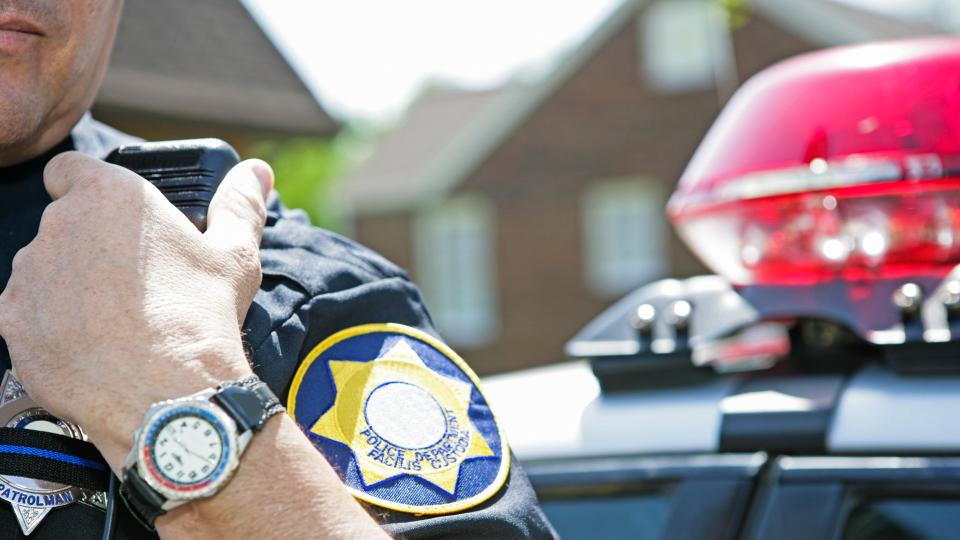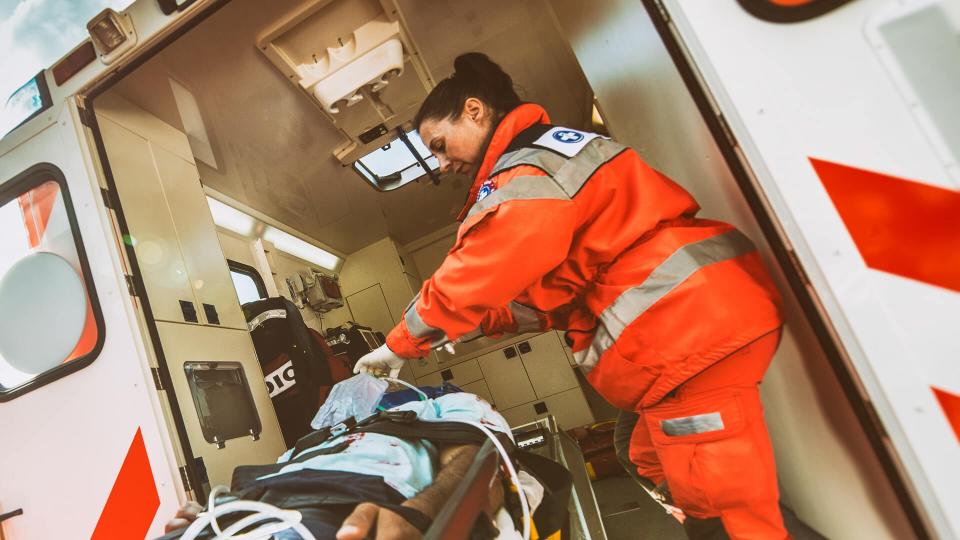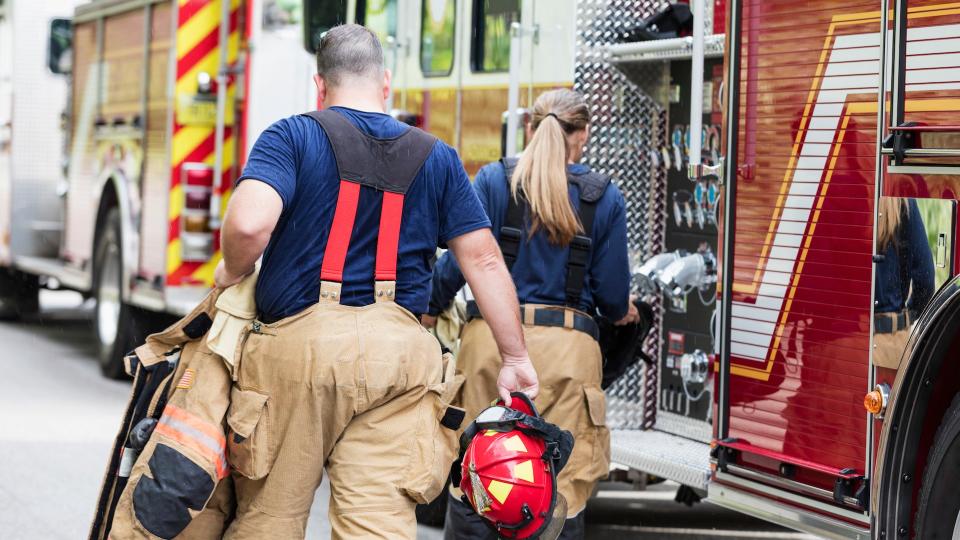The Top Jobs for Military Veterans, According to Experts

- Oops!Something went wrong.Please try again later.
Just like the civilian world, the military needs professionals in every occupation imaginable in order to function — clerks, cops, cooks, administrators, mechanics, teachers and everything in between. When the service members who work those jobs become veterans, they might transition to the civilian world’s version of that same field or start with something new.
Support Small: Don't Miss Out on Nominating Your Favorite Small Business To Be Featured on GOBankingRates -- Ends May 31
Some occupations, however, are more vet-friendly than others.
GOBankingRates consulted a variety of sources to come up with a list of 10 industries and fields that are great for veterans. Most have a high percentage of veteran employees compared to the overall population; others have unique similarities to life in the service that make the transition smooth and natural. The trifecta of careers that are known collectively as first responders — cops, firefighters and EMTs — get top billing, but plenty of other occupations are vet magnets, too.
Last updated: May 14, 2021

Law Enforcement
Law enforcement provides a natural transition from military life for many vets. It’s familiar — they wear uniforms and operate within a chain of command with many of the same ranks. Both cops and service members face dangers and stresses that are unique to those occupations, both are required to be proficient with firearms and both have to stay in good physical shape. The tradeoff is that both LEOs and service members find within their ranks a deep bond that is more common among family members than co-workers.
The U.S. Department of Justice (DOJ) formed the Office of Community Oriented Policing Services (COPS), which helps law enforcement organizations at all levels find and hire qualified vets. You can even be a cop for the VA, which has its own 4,000-member police force, nearly 90% of whom are veterans.
Military Money: A Financial Checklist for Big Life Events

EMT/Paramedic
Same as with law enforcement, many vets find that transitioning to work as EMTs — or, with a little more training and education, paramedics — is a smooth segue to civilian life. Also like law enforcement, the job can be stressful, demanding, emotionally taxing and dangerous.
EMS careers made the “Military Preference Jobs” section of the RecruitMilitary list of best jobs for veterans. Also like the next generation of cops, vets pursuing work as EMTs tend to skip the line ahead of equally qualified civilians. As outlined by MilitaryBenefits, the GI Bill paves a clear path to a career as an EMT or paramedic.
Discover: 10 Companies That Give Back to Veterans

Firefighter
Firefighters round out the big-three “military preference” careers that are collectively known as first responders. They, too, are more likely to be vets for all the same reasons as EMTs and law enforcement officers. Just like LEOs, firefighters might work in small departments in local municipalities or in sprawling federal agencies. The Bureau of Land Management, for example, maintains a world-class fire department that’s populated with veterans across all ranks. Organizations like Troops to Firefighters exist solely to help vets land jobs in fire departments.
Firefighter Is One: 30 Best Jobs If You Want To Retire Early

Information Technology
The action, danger and excitement of life as a first responder is certainly not for every vet.
Information technology is consistently one of the fields where vets are in the highest demand. That was true when Military.com ranked IT No. 1 in its list of hot military jobs in 2017 and it was just as true four years later when IT made the MilitaryTimes top five in 2020.
The reason IT employers place such a premium on service is simple. Today’s military is driven by technology at all levels, and much of that technology is the newest and most sophisticated in the world. Vets who held tech jobs during their time in the service are likely to have experience that few civilians can match — and employers know it.
Learn: These 6 Fields Will Have Plenty of Job Opportunities in 2021 and Beyond

Aerospace and Defense
Companies like Boeing, Northrop Grumman and Lockheed Martin are private-sector businesses, but their missions are so thoroughly intertwined with the military that they effectively function as an extension of the government. Far from contributing only to America’s war-fighting abilities, the many vets who work for aerospace and defense contractors are behind some of the most exciting and important developments in the world. Their impact is felt in outer space, in civilian aviation and in some of the coolest things you own and use every day, from your car’s GPS to the facial recognition in your Facebook photos.
See: The Most Profitable Company in Every State

The Public Sector
Veterans are far more likely to work for the government than the larger population. According to the most recent Bureau of Labor Statistics data, 19% of veterans, nearly one in five, work in federal, state or local government positions. By comparison, just 14% of non-veterans work in the public sector — but that only refers to veterans who don’t have a disability.
When concentrating specifically on disabled vets, it becomes clear just how important the public sector is to returning service members. Government work is one of the primary employers of disabled vets. A full 31% of employed veterans with disabilities — nearly one in three — work for the government.
Check Out: 10 VA Benefits Every Military Family Should Know About

Government Agencies
The federal government’s enormous and powerful alphabet agencies are, of course, part of the public sector. A career in the FBI, DEA, ATF and the rest, however, is different than working in your town’s solicitor’s office or post office. But those big federal agencies are just as eager to hire veterans.
In 2009, President Obama signed Executive Order 13518, aka "Employment of Veterans in the Federal Government.” All the big acronym agencies responded by creating veteran-employment outreach initiatives. The Department of Justice (DOJ), for example, responded to 13518 by creating the Veterans Employment Program Office.
More: 25 Tried-and-True Jobs That Will Last Through Any Recession

Security
America’s most elite private security firms look and function like military units and are populated with veterans almost exclusively. Veterans are also preferred for more run-of-the-mill security work, from nightclubs to corporate details. But for vets who aren’t ready to let go of the action and excitement of deployment, elite security firms offer all of that with much much better pay than Uncle Sam can muster. Companies like Vectrus, CACI and Gavin de Becker & Associates are always on the prowl for vets with the experience and fortitude to saddle up with their skilled and in-demand teams.
Related: How Much Do Veterans Make From Military Retirement?

Healthcare
Just as it is with everything else, healthcare in the military is more challenging, more advanced and more imperative than it is in the civilian world. Upon completing their service, vets with military healthcare experience are now — as they have always been — in high demand in both the public and private sectors. With legions of baby boomers now in or approaching old age, the healthcare field is booming. According to Military.com, the most in-demand specialties for vets include physical therapists, physician assistants, RNs, pharmacists and medical records technicians.
What's It Pay?: 20 Highest- and Lowest-Paying Jobs in Healthcare

Consulting
Other than hiring a disproportionate number of vets, the organizations behind every occupation on this list all have one thing in common: They all pay big bucks to consulting firms to help them streamline their operations. Consultants advise, troubleshoot and help organizations cut costs everywhere from accounting and IT to security and public relations. The FBI pays consultants and the companies that employ them, and so do law firms, airports, Walmart, Nike and local municipal governments.
Consulting has long been a magnet for veterans. When Monster paired with Military.com in 2020 to create its sixth annual Best Companies for Veterans list, consulting firms dominated the top spots.
More From GOBankingRates
This article originally appeared on GOBankingRates.com: The Top Jobs for Military Veterans, According to Experts

